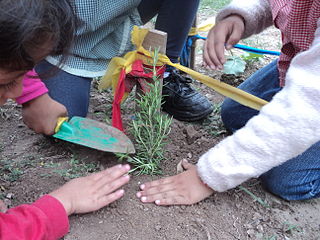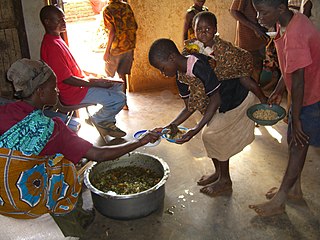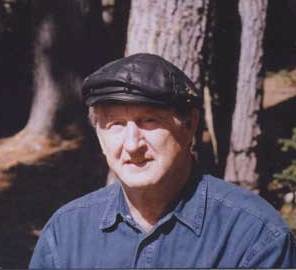Related Research Articles

Daniel Goleman is an American psychologist, author, and science journalist. For twelve years, he wrote for The New York Times, reporting on the brain and behavioral sciences. His 1995 book Emotional Intelligence was on The New York Times Best Seller list for a year and a half, a bestseller in many countries, and is in print worldwide in 40 languages. Apart from his books on emotional intelligence, Goleman has written books on topics including self-deception, creativity, transparency, meditation, social and emotional learning, ecoliteracy and the ecological crisis, and the Dalai Lama's vision for the future.

Alice Louise Waters is an American chef, restaurateur, and author. In 1971, she opened Chez Panisse, a restaurant in Berkeley, California, famous for its role in creating the farm-to-table movement and for pioneering California cuisine.
Sim Van der Ryn is an American architect, researcher and educator. Van der Ryn's professional interest has been applying principles of physical and social ecology to architecture and environmental design.

Environmental education (EE) refers to organized efforts to teach how natural environments function, and particularly, how human beings can manage behavior and ecosystems to live sustainably. It is a multi-disciplinary field integrating disciplines such as biology, chemistry, physics, ecology, earth science, atmospheric science, mathematics, and geography.
Culturally relevant teaching is instruction that takes into account students' cultural differences. Making education culturally relevant is thought to improve academic achievement, but understandings of the construct have developed over time Key characteristics and principles define the term, and research has allowed for the development and sharing of guidelines and associated teaching practices. Although examples of culturally relevant teaching programs exist, implementing it can be challenging.
Place-based education, sometimes called pedagogy of place, place-based learning, experiential education, community-based education, environmental education or more rarely, service learning, is an educational philosophy. The term was coined in the early 1990s by Laurie Lane-Zucker of The Orion Society and Dr. John Elder of Middlebury College. Orion's early work in the area of place-based education was funded by the Geraldine R. Dodge Foundation. Although educators have used its principles for some time, the approach was developed initially by The Orion Society, a Massachusetts-based nonprofit organization, as well as Professor David Sobel, Project Director at Antioch University New England.
John Uzo Ogbu was a Nigerian-American anthropologist and professor known for his theories on observed phenomena involving race and intelligence, especially how race and ethnic differences played out in educational and economic achievement. He suggested that being a "caste-like minority" affects motivation and achievement, depressing IQ scores. He also concluded that some students did poorly because high achievement was considered "acting white" among their peers. Ogbu was also involved in the 1996 controversy surrounding the use of African American Vernacular English in public schools in Oakland, California. The 2000 book Eminent Educators: Studies in Intellectual Influence focused on him as one of "four intellectual giants of the 20th century."
Kathryn Patricia Cross was an American scholar of educational research. Throughout her career, she explored adult education and higher learning, discussing methodology and pedagogy in terms of remediation and advancement in the university system.
Ecological literacy is the ability to understand the natural systems that make life on earth possible. To be ecoliterate means understanding the principles of organization of ecological communities and using those principles for creating sustainable human communities. The term was coined by Frank Herbert in his novel Dune - Liet-Kynes’s father tells him ‘You must cultivate ecological literacy among the people’ </ref>. It was later developed by American educator David W. Orr and physicist Fritjof Capra in the 1990s – thereby a new value entered education; the "well-being of the earth".
The ecopedagogy movement is an outgrowth of the theory and practice of critical pedagogy, a body of educational praxis influenced by the philosopher and educator Paulo Freire. Ecopedagogy's mission is to develop a robust appreciation for the collective potentials of humanity and to foster social justice throughout the world. It does so as part of a future-oriented, ecological and political vision that radically opposes the globalization of ideologies such as neoliberalism and imperialism, while also attempting to foment forms of critical ecoliteracy. Recently, there have been attempts to integrate critical eco-pedagogy, as defined by Greg Misiaszek with Modern Stoic philosophy to create Stoic eco-pedagogy.

Garden-based learning (GBL) encompasses programs, activities and projects in which the garden is the foundation for integrated learning, in and across disciplines, through active, engaging, real-world experiences that have personal meaning for children, youth, adults and communities in an informal outside learning setting. Garden-based learning is an instructional strategy that utilizes the garden as a teaching tool.
The Edible Schoolyard (ESY) is a 1-acre (4,000 m2) garden and kitchen program at the Martin Luther King Jr. Middle School, a public middle school in Berkeley, California. It was established in 1995 by chef and author Alice Waters. It is supported by the Edible Schoolyard Project, a non-profit organization founded by Waters that same year.
The term emotional literacy has often been used in parallel to, and sometimes interchangeably with, the term emotional intelligence. However, there are important differences between the two. Emotional literacy was noted as part of a project advocating humanistic education in the early 1970s.
The Private Eye Project is a research-based educational program created by Kerry Ruef in 1988. Founded in both inquiry-based learning and active learning approaches, it is designed to accelerate student learning by the development of critical thinking skills, creativity, literacy, and scientific literacy. Some of the main themes are "close observation", "thinking by analogy", "hands-on investigation", "changing scale", and "theorizing". One of the main tools used in the program for enhancing close observation is a loupe. The first three and one-half years were grant-funded by the Discuren Charitable Foundation and piloted in the Seattle Public Schools.

School feeding programs have been defined by the World Bank as "targeted social safety nets that provide both educational and health benefits to the most vulnerable children, thereby increasing enrollment rates, reducing absenteeism, and improving food security at the household level". Beyond improvements in access to food, school feeding programs also have a positive impact on nutritional status, gender equity, and educational status, each of which contributes to improving overall levels of country and human development.

Bonnie Ora Sherk was an American landscape-space artist, performance artist, landscape planner, and educator. She was the founder of The Farm, and A Living Library. Sherk was a professional artist who exhibited her work in museums and galleries around the world. Her work has also been published in art books, journals, and magazines. Her work is considered a pioneering contribution to Eco Art.

C. A. (Chet) Bowers was an American educator, author, lecturer and environmental activist. He wrote 27 books that focus on the cultural, linguistic, and technological roots of the current ecological crisis as well as the educational reforms necessary to promote greater ecological awareness.

MUSE Global Schools refers to a PK–12 co-educational private school in Calabasas, California, United States. It was co-founded by Suzy Amis Cameron and her sister Rebecca Amis in 2006. It operates from two campuses nestled in Malibu Canyon and has been described as the first vegan K–12 school in the country.

A school garden is an area designated for students to learn how to cultivate flowers and vegetable gardens in their school. They are commonly established to improve students' health, social development, and academic achievement.

In 2020, school systems in the United States began to close down in March because of the spread of COVID-19. This was a historic event in the history of the United States schooling system because it forced schools to shut-down. At the very peak of school closures, COVID-19 affected 55.1 million students in 124,000 public and private U.S. schools. The effects of widespread school shut-downs were felt nationwide, and aggravated several social inequalities in gender, technology, educational achievement, and mental health.
References
- ↑ Center for Ecoliteracy: What We Do www.ecoliteracy.org
- ↑ "Solving for Pattern: The STRAW Project." Whole Earth, www.wholeearth.com Spring 2001
- ↑ organization Wiserearth.org
- ↑ Dashka Slater. "The Whole Meal." California Magazine, May/June 2007.
- ↑ Sarah Henry. "New guide aims to improve school food beyond Berkeley." Berkeleyside, November 11, 2011.
- ↑ A Better Education. "Ecoliteracy - An Interview with Lisa Bennett.” abettereducation.blogspot.com
- ↑ Michael K. Stone/Center for Ecoliteracy. Smart by Nature: Schooling for Sustainability. Watershed Media, 2009. ISBN 978-0970950048
- ↑ Georgeanne Brennan and Ann M. Evans. Cooking with California Food in K-12 Schools. Center for Ecoliteracy/Learning in the Real World, 2011
- ↑ "Center for Ecoliteracy: California Food for California Kids." YouTube. Accessed 2012-10-15.
- ↑ Daniel Goleman, Lisa Bennett, and Zenobia Barlow. Ecoliterate: How Educators Are Cultivating Emotional, Social, and Ecological Intelligence. Jossey-Bass, 2012. ISBN 978-1118104576